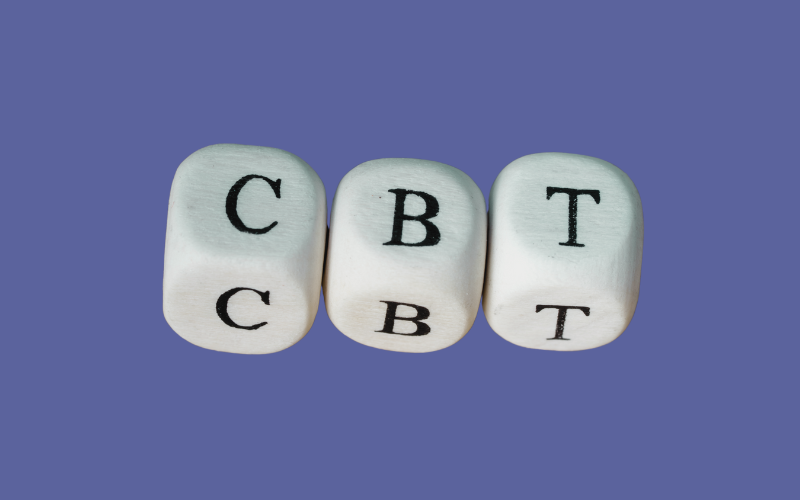What is CBT?
Cognitive Behavioural Therapy (CBT) is widely used in the UK to address mental health concerns like anxiety, depression, and OCD. Its popularity stems from its effectiveness, accessibility, and structure. CBT works by helping individuals identify and reframe unhelpful thoughts, which can lead to improved emotional responses and behaviours.
How CBT Works
CBT primarily focuses on thought patterns. The aim is to challenge negative thinking and replace it with healthier, more realistic perspectives. It’s generally effective for mild to moderate anxiety and depression.
 CBT’s Limitations
CBT’s Limitations
While CBT is beneficial for many, it’s not a universal solution. It focuses on cognitive patterns but often overlooks deeper emotional, social, or physical factors that might be contributing to distress. For instance, during moments of heightened emotion or threat, our nervous system can react before our thoughts, making cognitive reframing difficult in real-time.
Additionally, CBT reflects a distinctly Western, Eurocentric, and secular understanding of mental health. It prioritises individual cognition and rational thinking, which may not align with the values or lived experiences of everyone. This focus can overlook the role of culture, community, and faith—factors that profoundly shape how people experience, express, and manage emotional distress. In collectivist cultures or communities where religious or spiritual beliefs are central, emotional wellbeing is often tied to family expectations, social dynamics, and shared meaning. For those whose worldview is influenced by these frameworks, a purely cognitive approach may feel disconnected or insufficient.
It’s important to emphasise that if CBT hasn’t worked for you, it doesn’t mean you’ve failed. Sometimes, it’s the approach that doesn’t fit—and that’s okay. A more holistic or culturally sensitive form of support may be a better fit for your needs.
A Holistic View of Wellbeing
As an osteopath with a focus on holistic care, I’ve found that CBT doesn’t address the full complexity of human experience. It focuses on thoughts but doesn’t always consider the interconnectedness of mind, body, emotions, and environment. This integrated perspective is increasingly supported by research, which highlights the need for more comprehensive approaches to mental health.
Rather than just shifting thinking, I believe it’s crucial to address the whole person. This means supporting emotional and physical healing, not just cognitive reframing. I am inspired by leaders in holistic care who challenge traditional models, integrating body-based therapies with cognitive approaches for more effective outcomes.

What Else Shapes Our Mental Health?
CBT is based on the idea that thoughts precede emotions. For example, thinking “I’ll fail this presentation” can lead to anxiety. Changing the thought is said to change the feeling. However, emotions can arise before thoughts, particularly in situations of stress or perceived threat.
Neuroscience shows that emotions often arise first, especially when our nervous system is triggered. For example, fear may occur when giving a presentation, even before the thought “I’m going to fail” emerges. This emotion-first response is key to understanding how our bodies and minds interact during stressful events.
The Science: Emotions and the Developing Brain
In children and adolescents, emotional responses often override rational thought because the part of the brain responsible for emotions—the limbic system—matures earlier than the part responsible for logical thinking, the prefrontal cortex. This difference in development can result in stronger emotional responses, which can be harder to manage during stressful situations.
Understanding the brain’s emotional processing helps us better support emotional regulation in young people. Emotions often arise from bodily sensations or past experiences, creating a feedback loop with thoughts and feelings.

Exploring Other Therapies
If CBT hasn’t worked for you, there are other therapies that may offer a more comprehensive approach. These include therapies that focus on the body, emotions, or the nervous system. Mental health care is increasingly embracing trauma-informed and integrative approaches that address the whole person—mind, body, and emotions.
Body-Based and Trauma-Informed Therapies
Some therapies go beyond thought-based interventions to address physical and emotional aspects of distress:
- Human Givens Approach: Focuses on unmet emotional needs and provides a framework for addressing emotional difficulties.
- EMDR (Eye Movement Desensitisation and Reprocessing): Works with the nervous system to process and release trauma.
- Clinical Hypnotherapy: Helps shift negative patterns by addressing the subconscious and physical states.
- Somatic Experiencing: Focuses on bodily sensations, helping release trauma stored physically.
Integrative Therapies
Combining CBT with other approaches can also be more effective, such as:
- Mindfulness-Based Cognitive Therapy (MBCT): Combines cognitive techniques with mindfulness practices.
- Compassion-Focused Therapy (CFT): Emphasises developing self-compassion to address emotional pain.
Psychedelic Therapy
Psychedelic-assisted therapy is showing promise for treating deep emotional trauma, depression, and anxiety. Though still in clinical trials, it offers hope for those who find traditional methods insufficient.

Finding What Works for You
While CBT can be helpful for mild to moderate concerns, it doesn’t always address more complex issues, such as trauma or emotional overwhelm. Mental health treatment is evolving to embrace a more holistic view, recognising that healing involves the mind, body, emotions, and often our cultural or spiritual roots.
Reminder: If CBT hasn’t helped, it doesn’t mean you’ve failed. It may simply mean you need a different approach — one that resonates more deeply with your unique needs.
End note:
Influential Thinkers in Holistic Mental Health
- Bessel van der Kolk – The Body Keeps the Score; body-based trauma therapies.
- Pat Ogden – Co-founder of Sensorimotor Psychotherapy.
- Dan Siegel – Interpersonal neurobiology; brain-body-relationship connections.
- Peter Levine – Founder of Somatic Experiencing.
- Jon Kabat-Zinn – Mindfulness-Based Stress Reduction (MBSR).
- David Berceli – Trauma Releasing Exercises (TRE).
- Alice Miller – Childhood trauma and emotional abuse.
- Rick Hanson – Emotional regulation and mindfulness.
- Esther Perel – Relationships and trauma.
- Joe Griffin & Ivan Tyrrell – Human Givens approach.
- Dr Thema Bryant-Davis – Trauma, race, and cultural experiences.
- Stephen Porges – Polyvagal Theory.
- Dr Mariel Buqué – Trauma and cultural wellness.
- Gabor Maté – Addiction, trauma, and childhood development.







